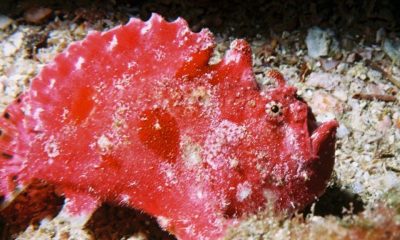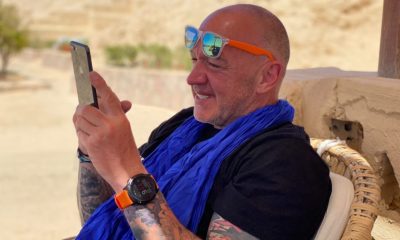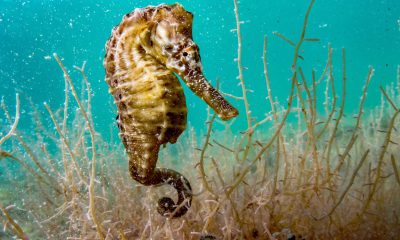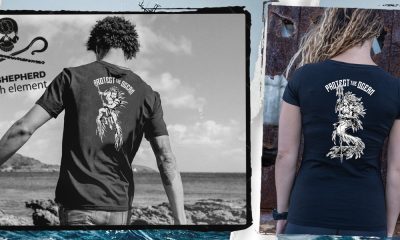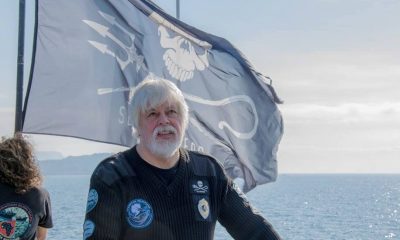News
Cocaine, Corruption, and Shark Fins
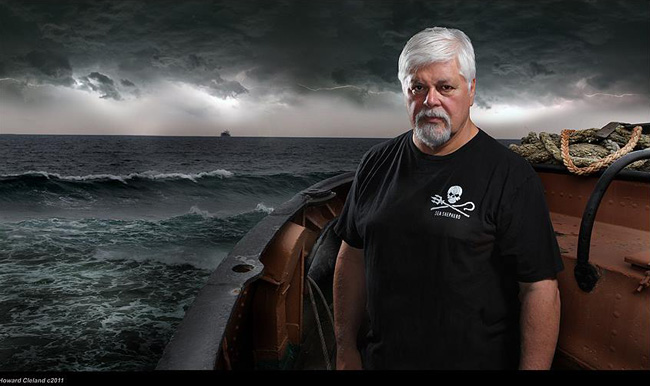
Fourteen years ago in 2001, I took my ship Ocean Warrior to Cocos Island, Costa Rica. When we arrived we found an Ecuadorian longliner, the San Jose, busily slaughtering sharks not far off the beach of the Cocos Island National Park.
The rangers were watching from the shore but not having a boat, they could do nothing.
We offered our help and together the Cocos Island rangers and the Sea Shepherd crew stopped the San Jose, confiscated many kilometers of longlines and hundreds of dead sharks. We then assisted with the arrest of the crew.
The San Jose was the first large illegal fishing boat caught and stopped in the Cocos Island Marine Reserve and the first illegal fishing vessel to be confiscated by the Costa Rican courts.
Because of that arrest, I made a formal agreement with the Costa Rican Ministry of the Environment to begin patrolling the Cocos Island Marine Reserve in partnership with the rangers beginning in 2002.
Sea Shepherd began a partnership just two years before with the Galapagos National Park and the Ecuadorian Federal Police and that partnership continues fifteen years later.
The partnership with Costa Rica never happened because a Costa Rican poaching vessel the Varadero I was caught by my crew and I in Guatemalan territorial waters in 2002 and at the request of the Guatemalan authorities, we stopped their illegal activities. No one was harmed and their vessel was not damaged.
However these eight fishermen returned to Costa Rica and accused me of trying to murder them. As a result I went to court and presented our video evidence and witnesses and the charges were dropped. A week later they charged me with eight counts of assault. Once again I went to court and once again the charges were dismissed and I was given clearance to depart Costa Rica.
I never heard another word about this until May 2012 when the German border guards arrested me in Frankfurt on a Costa Rican extradition warrant for a charge which was now stated as something called “shipwreck endangerment.”
This arrest was followed immediately by a Japanese extradition request. Japan wanted me extradited for “conspiracy to trespass” on a whaling ship and for “obstruction of business.”
Germany made the decision to extradite me to Japan which gave me no choice but to skip bail and escape to sea where I spent the next 15 months from August 2012 until the end of October 2013.
Because of the two extradition requests and the recognition of these extradition requests by Germany, I was placed on the Interpol Red List in August 2012.
No one has ever been placed on the Interpol Red List for activities that did not cause injury or death, property damage or the theft of money, state secrets, or property.
In my case, I stopped a shark finning operation in Guatemalan waters at the request of the Guatemalan government and Japan charged me because of our opposition to their illegal whaling operations (as ruled by the International Court of Justice) in the Southern Ocean.
But lets consider the Costa Rican extradition request. That incident occurred in 2002 and eight poachers from a vessel that had already been previously charged with poaching brought in a complaint after we stopped them from poaching. They had no video or photographic evidence. Sea Shepherd documented the entire incident. The accusation that we tried to murder them was ridiculous.
The charges were brought against me in the port city of Puntarenas where illegal fishing is epidemic. During the initial trial we discovered and documented the illegal landing of sharks in Puntarenas. It was not hard, the shark fins were being dried in public view. We reported the activity to the police and the authorities did nothing. Instead we were warned to not harass the fishermen.
Why would the court in Puntarenas act so aggressively to respond to a complaint by eight poachers?
There was and is more behind this and I think the motivating factor is narcotics.
With the recent revelation that a man named Gilbert Bell has been arrested and fingered as the notorious drug lord “Macho Coca” things have become clearer.
Gilbert Bell is an advisor to the Costa Rican Fisheries Institute (INCOPESCA), a government agency that has been the subject of a few criminal investigations.
More than half the INCOPESCA board is made up of representatives of the fishing industry.
In 2012 INCOPESCA’s Vice President Alvaro Moreno was fired for corruption and since 2011, the current President of INCOPESCA Luis Dobles has been under criminal investigation for failure to sanction two fishing boats accused of shark finning in 2011.
In 2014 The U.S. Coast Guard captured a Costa Rican fishing vessel and arrested three Costa Ricans and one Nicaraguan suspect off the coast of Cocos Island. The boat had 2.3 tons of cocaine on board.
“We are more concerned about these [drug trafficking] organizations infiltrating our fishermen or the fishing boats that were once dedicated to fishing and are now dedicated to the trafficking of drugs,” said Public Security Vice Minister Gustavo Mata. “Generally speaking, more of our fishermen are dedicating themselves to coca trafficking.”
However back in 2001, rangers on Cocos Island told me at that time that they were very concerned about drugs being transported on fishing vessels. This is not anything new.
Cocos Island is a waypoint for the transportation of drugs and has been for some time.
It is becoming more clear to me that our plans to come to Cocos Island in 2002 for permanent patrols represented a threat to the narco-traffickers.
Thus charges were laid against me to prevent these permanent patrols from happening. This is also the reason that our offer of two first-rate fast patrol vessels for Cocos Island has been turned down.
INCOPESCA and other people of influence in Costa Rica do not want eyes and ears anywhere near Cocos Island – not because of illegal fishing but more because of illegal shipments and at-sea transfers of drugs.
The case against me simply does not make sense. In 2002, at the request of the Guatemalan government, we stopped a Costa Rican shark-finning vessel, the Varadero I in Guatemalan waters. We caught and filmed them in the act of catching and finning sharks. We stopped them with fire hoses. No one was hurt and there was no property damage. A film crew onboard working on the documentary film Sharkwater documented the entire incident.
The eight fishermen onboard the Varadero I reported to Costa Rican authorities that we tried to murder them. They had no evidence, no documentation, just their word against the 30 Sea Shepherd crew members and independent film-makers who witnessed and documented the incident on the Ocean Warrior.
I appeared in court in 2002 and our film clearly demonstrated that there was no attempt to murder the fishermen. That charge was dismissed. A week later I was charged once again with 8 counts of assault. Once again our film disproved these charges and the charges were dismissed and I was given clearance to depart Costa Rica.
I heard nothing more until I was arrested 10 years later in Germany, this time for the charge of “shipwreck endangerment.”
The accusation as it stands now states that the incident took place in international waters yet it also states an exact position, a position that is well inside Guatemalan waters where Guatemalan law allowed us to intervene against this illegal activity. The official accusation contradicts itself stating that the incident was in Guatemalan waters and also in international waters. It can’t be both yet in the accusation it is stated as such.
The Costa Rican court states there is no evidence that the Costa Rican fishermen were poachers despite the fact that we filmed them poaching and the fact that in 2001, the Varadero I was arrested in the Galapagos (Ecuador) for illegal fishing.
The amount of time and effort that Costa Rica has invested in this case with monies from the Costa Rican people, over 13 years, is completely disproportional to a situation where no one was hurt and property was not damaged.
The obvious question is why?
For years I have thought that the courts, INCOPESCA and other government officials were protecting poachers and there is a great deal of evidence that they have in fact been protecting poachers.
Now in light of the arrest of Macho Coca however, I think it goes deeper than that. The arrest of drug lord and INCOPESCA advisor Gilbert Bell leads me to believe that this is also about protecting the narco-traffickers.
In May 2013, turtle conservationist Jairo Mora Sandoval was murdered by narco-poachers at Moins beach. This year Sea Shepherd crew protecting turtles were assaulted by poachers at the same beach. Instead of investigating the assaults, the police harassed the Sea Shepherd crew and searched the Sea Shepherd camp for drugs, scattering and damaging the property of the crew in the process.
In the case of Jairo Mora Sandoval, his killers were acquitted earlier this year by the Costa Rican Court, not because they were innocent, but because the police and the prosecution conveniently lost crucial evidence. Moins beach, where Jairo was murdered, is a beach that is frequently used to drop off drugs from Colombia and Panama.
Earlier this year Sea Shepherd had arranged with the Costa Rican Ministry of the Environment for a plan to provide assistance once again to defend Cocos Island. Sea Shepherd Global Director Alex Cornelissen was invited to meet with the Ministry and flew to San Jose from the Netherlands to do just that. However at the last minute the meeting was cancelled with the excuse being that they could not work with Sea Shepherd as long as I was wanted by the courts and Costa Rica continues seeking to extradite me.
The rangers at Cocos Island need assistance. They need a good full time patrol boat. We have such a boat – two of them in fact – and we can deploy these boats on a permanent basis to work in partnership with the rangers to stop all poaching activities in the Cocos Island Marine Reserve. We would also like to install an AIS system to monitor all vessel traffic. We installed just such a system in the Galapagos for around one million Euros and we maintain it on a permanent basis and it has been a very successful program.
However, I don’t believe that some Costa Rican government officials want eyes and ears that they cannot control anywhere near Cocos Island. They don’t want the world to see what I believe to be is a major way station in the international traffic of drugs, primarily of cocaine.
I am taking this case before the Inter-American Commission on Human Rights and we will continue to investigate just why it is that the Costa Rican government is protecting poachers and refusing to properly patrol the Cocos Islands National Park Marine Reserve.
Marine Life & Conservation
Steve Backshall to headline Shark Trust’s flagship event: For the Love of Sharks

Join a host of amazing, shark loving, speakers including Steve Backshall and the Shark Trust team for an evening celebrating shark conservation at the Royal Geographical Society in London this November.
Date: 29th November 2024
Time: 6-10pm
Location: Royal Geographical Society, London
Tickets: https://www.sharktrust.org/Event/flos24
The event will be a celebration of all things shark. Those lucky enough to get hold of tickets will hear from engaging guest speakers with a passion for sharks.
The line-up includes (*subject to change if unforeseen circumstances arise)
Steve Backshall: One of television’s busiest presenters, BAFTA award-winning wildlife expert Steve has been passionate about the wild world ever since he was young.
Steve’s impressive TV career has taken him all around the world, investigating a wide array of species and environments. Steve has filmed over 100 hours of children’s wildlife programmes with the BAFTA award winning Deadly 60 franchise and recently, with Sky Nature, for his new series ‘Whale with Steve Backshall’. He has been a patron for the Shark Trust for 10 years.
Simon Rogerson: is a photojournalist specialising in natural history, diving and the sea.
He is editor of SCUBA magazine, the official journal of the British Sub-Aqua Club. Simon started his career as a crime reporter but gravitated towards his ‘less depressing’ interest in underwater exploration, joining the staff of DIVE magazine in 1999. In 2005 he was named ‘Editor of the Year’ in the PPA’s Independent Publishing Awards. Simon also works as a freelance writer, contributing frequently to the Sunday Times and Telegraph, in addition to BBC Wildlife, Esquire, and a host of international diving magazines. He is the author of a book, Dive Red Sea, published by Ultimate Sports. Now based in Berkshire, Simon has been a Patron of the Shark Trust for 20 years.
More speakers to be announced soon. Head to the Shark Trust website to learn more.
The evening will also allow guests the final chance to see the Oceanic 31, shark art exhibition. Some of the artwork will be auctioned/raffled at the event, while the rest will be auctioned online to raise money for the Shark Trust Oceanic Programme.
For the Love of Sharks is an evening with something for everyone who is interested and fascinated by sharks. Join the Shark Trust, their Patrons, Trustees and Staff, along with a host of supporters for this celebration of shark conservation.
For more information or to buy a ticket: https://www.sharktrust.org/Event/flos24
News
Stay Longer for Less at Temple Point, Kenya with Dive Worldwide
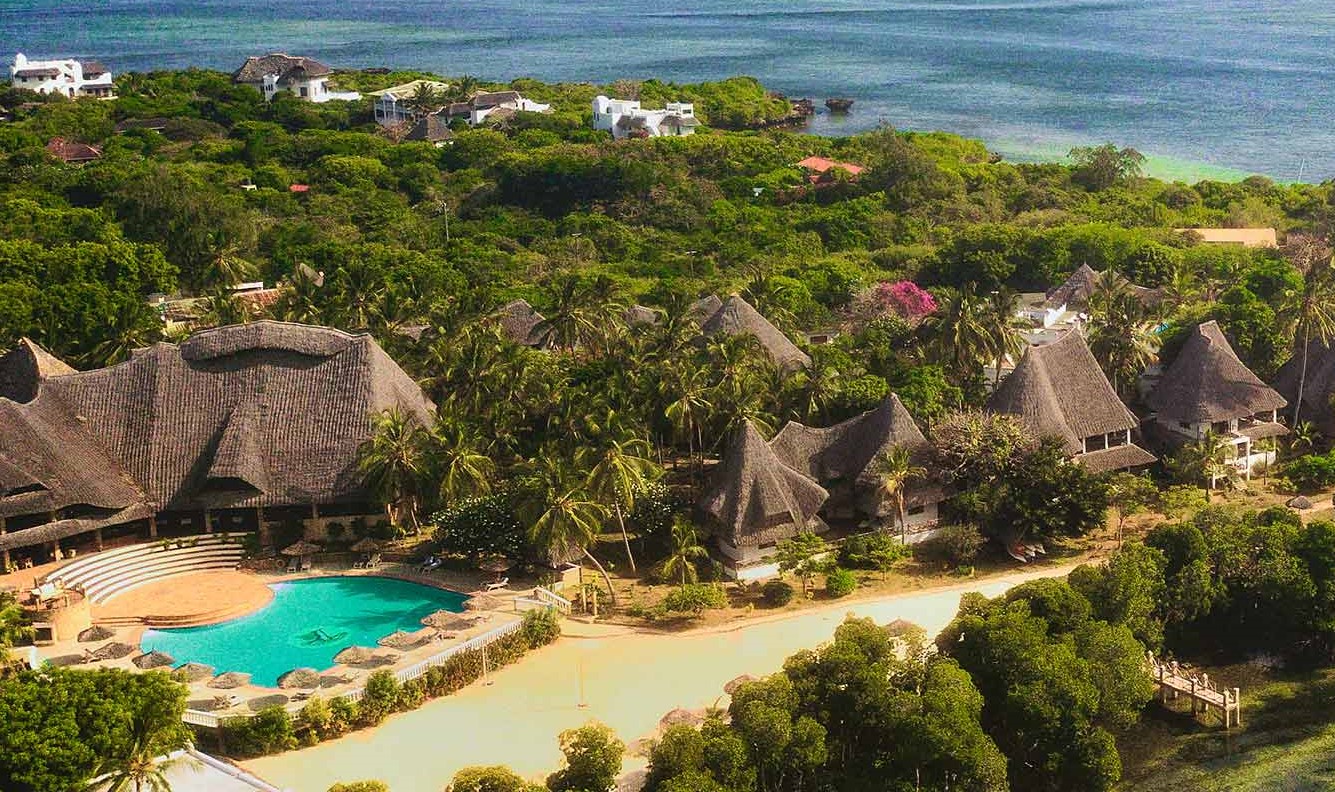
Dive Worldwide has recently introduced Kenya to its portfolio of dive destinations, making it a new must-visit for divers. The company has chosen Temple Point Resort, located in Watamu, a small town on Kenya’s Indian Ocean Coast. The resort embodies the spirit of Kenya, with thatched roof buildings and bright white interiors, complemented with local art. The Creek Deluxe rooms enjoy a creek view and sunset vistas, whilst Boutique Garden rooms offer peace nestled in lush greenery.
An abundance of activities such as golf, stand up paddleboarding and kite surfing await those looking for action; while those in search of rejuvenation may partake in a range of yoga classes, or indulge in the spa. Spend evenings dining poolside dining or lazing in hammocks suspended over the creek; there is no detail missed at Temple Point.
The waters surrounding Temple Point Resort are bustling with life, however, there is also an opportunity to explore on dry land. Tsavo National Park is close enough for a day safari, allowing guests to double up on the wildlife experiences Kenya has to offer, from elephants to whale sharks.
Suggested Dive Itinerary: Dive and Discover Kenya
Embark on an adventure to one of Africa’s finest marine parks, Watamu, the first of its kind in the continent. Created in 1968, Watamu offers excellent diving and snorkelling for those of all experience levels. Lively coral reefs and the surrounding waters are home to over 1,000 species of fish, devil rays, mantas, whale sharks, dolphins and turtles.
DEAL: Stay 12 nights for the price of 10 at Temple Point Resort
Price: Dive and Discover Kenya now costs £2295pp, saving £150 per person. Including international flights from the UK, 12 nights’ B&B (for the price of 10), transfers, 5 days, 10 dive pack, tanks and weights. Based on travel in September ONLY. https://www.diveworldwide.com/trip-ideas/dive-discover-kenya#details
For more information visit: diveworldwide.com or call 01962 302 087
-

 News3 months ago
News3 months agoHone your underwater photography skills with Alphamarine Photography at Red Sea Diving Safari in March
-

 News3 months ago
News3 months agoCapturing Critters in Lembeh Underwater Photography Workshop 2024: Event Roundup
-

 Marine Life & Conservation Blogs3 months ago
Marine Life & Conservation Blogs3 months agoCreature Feature: Swell Sharks
-

 Blogs2 months ago
Blogs2 months agoMurex Resorts: Passport to Paradise!
-

 Blogs2 months ago
Blogs2 months agoDiver Discovering Whale Skeletons Beneath Ice Judged World’s Best Underwater Photograph
-

 Gear Reviews3 weeks ago
Gear Reviews3 weeks agoGEAR REVIEW – Revolutionising Diving Comfort: The Sharkskin T2 Chillproof Suit
-

 Gear Reviews3 months ago
Gear Reviews3 months agoGear Review: Oceanic+ Dive Housing for iPhone
-

 Marine Life & Conservation2 months ago
Marine Life & Conservation2 months agoSave the Manatee Club launches brand new webcams at Silver Springs State Park, Florida





